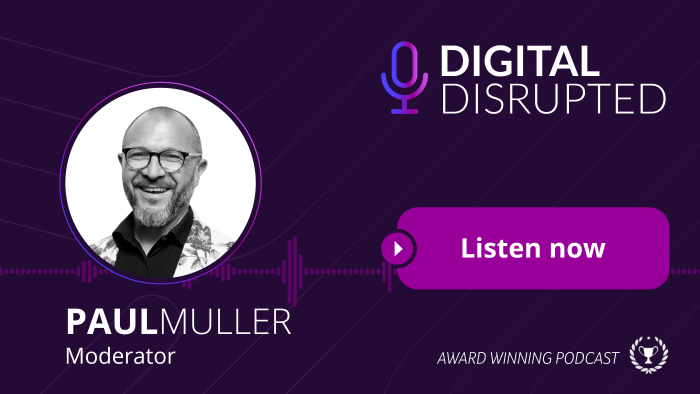Digital: Disrupted: Ready for the Next Wave of Digital Transformation?
July 14, 2023
In this week’s episode, Paul is joined by Pari Natarajan, the CEO of Zinnov, for a conversation around digital transformation 2.0. Pari shares how companies can use digital transformation to their advantage to gain a competitive edge, and potential ethical concerns with new technologies like generative AI.
Digital: Disrupted is a weekly podcast sponsored by Rocket Software, in which Paul Muller dives into the unique angles of digital transformation — the human side, the industry specifics, the pros and cons, and the unknown future. Paul asks tech/business experts today’s biggest questions, from “how do you go from disrupted to disruptor?” to “how does this matter to humanity?” Subscribe to gain foresight into what’s coming and insight on how to navigate it.
About This Week’s Guest:
Pari is the CEO of Zinnov, a consulting firm that helps organizations globalize their business, tackle organizational challenges, and build institutional capability. He has over 25 years of experience in driving the globalization vision for more than 250 Fortune 500 companies.
Listen to the full episode here or check out some highlights below.
Paul Muller: Alright, so let's talk about digital transformation 2.0. I guess first question is what is it and how is it different from digital transformation that we still seem to be going through? In fact, go back to my question, are we done with digital transformation?
Pari Natarajan: No Paul. So, I think from a technology perspective we'll keep moving forward. I don't think there's going to be any rest in that. So, to talk about digital transformation 2.0, we have to go back to what is 1.0 and if you think about what happened in the last decade, we call it digital plumbing. What happened is we had things moved from an on-prem to cloud and the move to cloud made a big difference. Think of small businesses, a decade ago you had to be a large company with massive data centers to do even simple things like having a very strong CRM system but moving into cloud made it available for every small business. So that itself had a big impact. Then iPhone and mobility came in, so that enabled people on the edge and then you had the IOT sensors in the factories that made factories more intelligent.
So, you had what we call digital plumbing on the edge as well on the cloud that enabled us to aggregate data. We digitized a lot of the processes and now we have a lot of data. Then you add in the data lake and you're able to drive intelligence. So that's kind of what we did and that also allowed this kind of collaboration during COVID. Everybody is able to work from home but still able to seamlessly collaborate. That was the benefit of digital transformation.
PM: And you mentioned obviously generative AI. It does seem to me like literally in the last six, nine months there's been this sense that technology has got a whole new inflection point that is introduced in terms of the capability that technology could bring to the table that I think even people inside the industry are a little bit shocked at just how much things like large language models have accelerated our ability to do as you say, those sorts of autonomous actions that we always assumed would just need a person to be in the loop. Is that roughly what you're getting at?
PN: Yeah, exactly, it's even more fundamental than that. If you look at the last hundred years of industry revolution, we are able to break down complex human beings, the purpose in life, the need to need to socialize, need to earn a living into a set of manual tasks, a repeatable manual task you can measure and monitor. That happened in the early part of industrial evolution and continued in the back-office workers, people are manually doing some of this work, but today we're seeing generative AI argument individuals’ capabilities for tasks they are not good at. For example, I'm great in programming but I'm bad in creative work or I'm great creatively but I don't know how to code but now it's going to enable that.
So, it's augmenting areas that we are not good at, and humans can go back to being humans, which is very complex. You have multiple skills or varying capabilities and then you're going to use technology to enable and make you complete. So, you're able to do a lot more things, versus now you are reduced to doing one thing really well, one task really well and that's not exciting for a lot of people. If you look at the next generation of Gen Z, they want a lot more purpose from the jobs they're doing, and they want satisfaction from the job more so the generation before their job was to make a living and that's changed. It is going to enable the next generation of people to be able to perform different kinds of jobs but that I think that's more fundamental.



